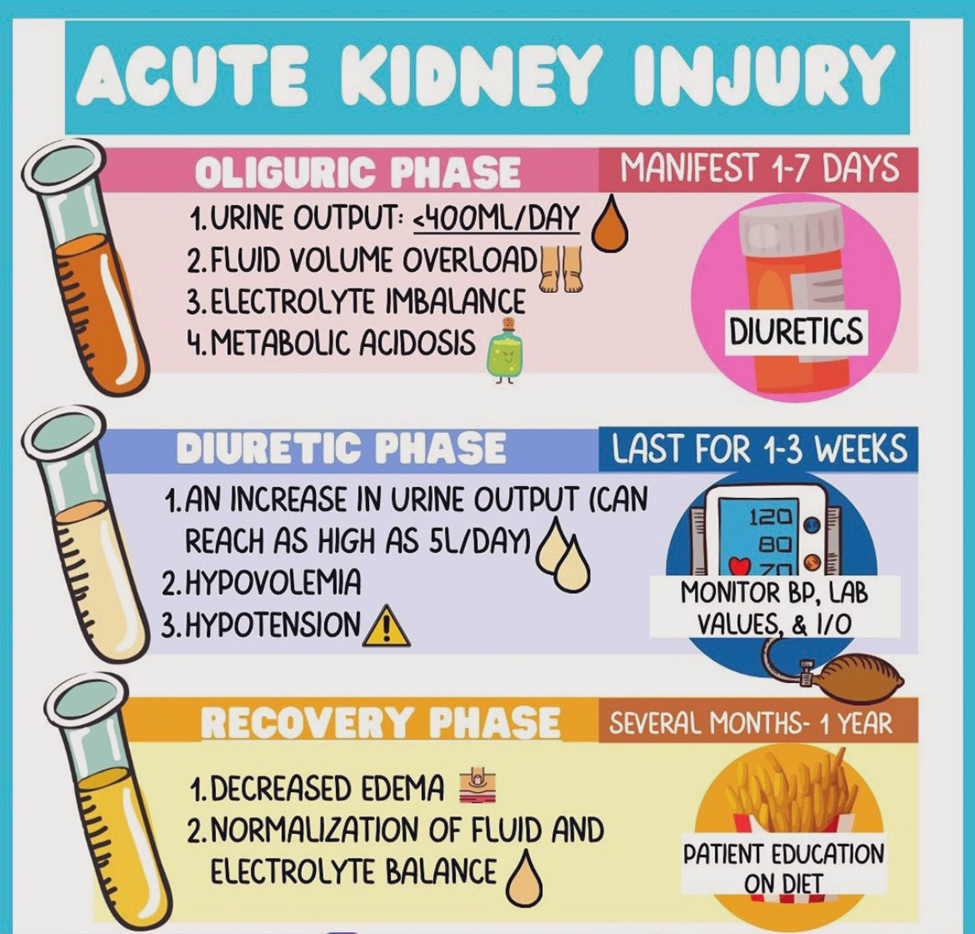A client who has developed acute kidney injury (AKI) due to an aminoglycoside antibiotic has moved from the oliguric phase to the diuretic phase of AKI Which parameters are most important for the nurse to plan to carefully monitor?
Hypovolemia and electrocardiographic (ECG) changes.
Uremic irritation of mucous membranes and skin surfaces.
Side effects of total parental nutrition (TPN) and Intralipids.
Elevated creatinine and blood urea nitrogen (BUN)
The Correct Answer is A
A. Hypovolemia and electrocardiographic (ECG) changes:
During the diuretic phase of AKI, there is an increased urine output, and the risk of dehydration and hypovolemia is elevated. The nurse should closely monitor fluid balance to prevent dehydration, and ECG changes may occur due to electrolyte imbalances (such as hypokalemia) associated with diuresis.
B. Uremic irritation of mucous membranes and skin surfaces:
Uremic symptoms are more prominent in the oliguric phase of AKI when waste products accumulate in the blood. In the diuretic phase, the focus shifts more toward managing fluid and electrolyte balance.
C. Side effects of total parental nutrition (TPN) and Intralipids:
TPN and Intralipids are not directly related to the diuretic phase of AKI. Monitoring for side effects of TPN and Intralipids may be relevant in other clinical contexts but is not the primary concern in the diuretic phase.
D. Elevated creatinine and blood urea nitrogen (BUN):
Monitoring creatinine and BUN levels is important for assessing kidney function, but in the diuretic phase, the focus shifts to managing fluid and electrolyte balance. The risk of hypovolemia and electrolyte imbalances is more immediate during this phase.

Nursing Test Bank
Naxlex Comprehensive Predictor Exams
Related Questions
Correct Answer is B
Explanation
A. Administer a prescribed sedative:
Sedatives may depress the respiratory drive, which can be detrimental in a client with respiratory distress. It is not the appropriate intervention in this case.
B. Assist the client to an upright position.
Positioning the client upright helps improve respiratory mechanics by reducing the pressure on the diaphragm and allowing better lung expansion. This position can enhance the efficiency of breathing and alleviate symptoms of breathlessness.
C. Encourage the client to drink water:
While maintaining hydration is important, it may not directly address the immediate respiratory distress. Addressing the respiratory symptoms with an upright position is more crucial at this moment.
D. Apply a high-flow venturi mask:
While oxygen therapy may be necessary for a client with COPD experiencing respiratory distress, the first step is to assist the client to an upright position to improve respiratory mechanics. Applying a high-flow venturi mask may be a subsequent intervention based on the overall assessment, but positioning is the initial priority.
Correct Answer is ["0.4"]
Explanation
Step 1: Use the Formula
mL = units prescribed ÷ units per mL
Step 2: Plug in the Given Values
mL = 200,000 ÷ 500,000
Step 3: Simplify the Fraction
mL = 2 ÷ 5
Step 4: Convert the Fraction to a Decimal
mL = 0.4 mL
The nurse should administer 0.4 mL of penicillin to this client.
Whether you are a student looking to ace your exams or a practicing nurse seeking to enhance your expertise , our nursing education contents will empower you with the confidence and competence to make a difference in the lives of patients and become a respected leader in the healthcare field.
Visit Naxlex, invest in your future and unlock endless possibilities with our unparalleled nursing education contents today
Report Wrong Answer on the Current Question
Do you disagree with the answer? If yes, what is your expected answer? Explain.
Kindly be descriptive with the issue you are facing.
